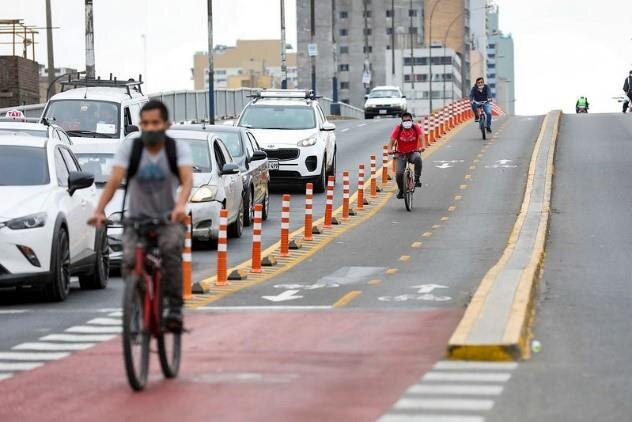
Bogota, Colombia

Temporary Bike lines
Bogota’s Ciclovías (bike lanes) have been extended to incorporate 84 km (52 miles) of temporary new bike lanes to the city’s existing 550 km Ciclovía network. This effort has been implemented to prevent the spread of COVID-19 by further reducing crowding and person-to-person contact on the city’s public transport system. The new lanes – which function 24 hours a day, 7 days a week – make Bogotá’s Ciclovía network among the largest of its kind in the world and are helping reduce congestion and improve traffic safety. Read more about this effort here…
When COVID-19 began to spread in Bogota, community-based physical activity programmes were suspended. In response, the Colombian Ministry of Sports and the District Institute of Sports and Recreation (IDRD) launched La Ruta del Movimiento, an initiative that offers free physical activity sessions led by trained instructors in outdoor locations such as communal areas in apartment buildings or gardens, to help counteract the sedentary behaviours and falling levels of physical activity in the city triggered by COVID-19 lockdown policies. Read more about this effort here…
Lima, Peru
Responding to the COVID-19 pandemic on wheels
Concerned about the risk of crowded public transport during the COVID-19 outbreak, the capital of Peru is strengthening its cycling infrastructure with almost 50 km of emergency cycle lanes and additional parking. In a city known for its jammed traffic, the city decided to expand its cycling lanes and reconfigure others to prioritized those which would connect to their cycle network and facilitate access to public services such as hospitals. Across the city, twelve locations were selected to benefit from extra parking infrastructure, each with the capacity for 20 bicycles. Read more about this initiative here…
Buenos Aires, Argentina
Integrated response in Villa 20 to reduce the impact of COVID-19 on lives and livelihoods
When COVID-19 reached Buenos Aires in March 2020, the City Housing Institute (IVC), in collaboration with local grassroots organizations, built on prior initiatives to focus on strengthening resilience in the Villa 20 neighbourhood through a set of interventions to help meet the community’s food, health, and social and economic needs. The result has been a lower number of confirmed cases and deaths, and a high level of community willingness to participate in social distancing, food distributions, and testing. Read the details of this initiative here…




